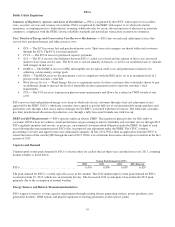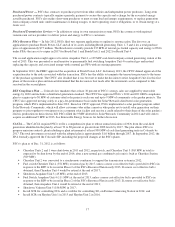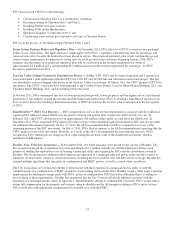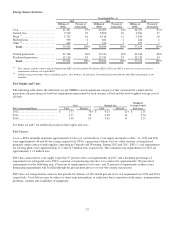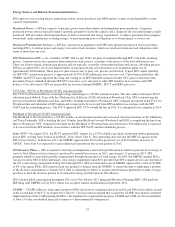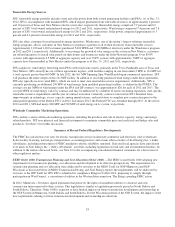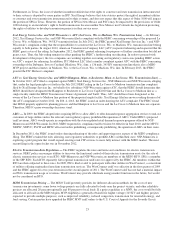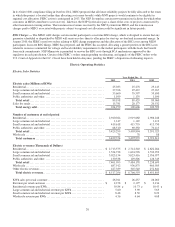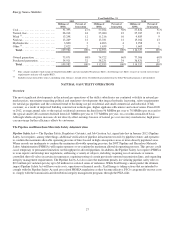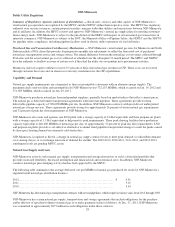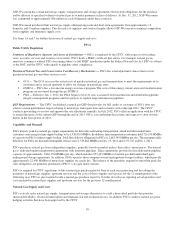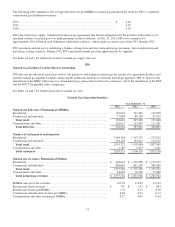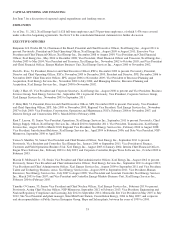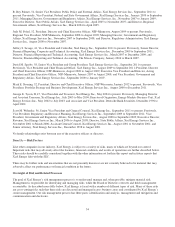Xcel Energy 2012 Annual Report Download - page 35
Download and view the complete annual report
Please find page 35 of the 2012 Xcel Energy annual report below. You can navigate through the pages in the report by either clicking on the pages listed below, or by using the keyword search tool below to find specific information within the annual report.25
Furthermore, in Texas, the issue of whether incumbent utilities have the rights to construct and own transmission interconnected
to their system is disputed by some parties in SPP. Xcel Energy believes that state statutes protect the right of incumbent utilities
to construct and own transmission interconnected to their systems, and does not expect that this aspect of Order 1000 will impact
the portion of SPS in Texas. However, the portion of SPS in New Mexico and PSCo may be impacted by the provisions of Order
1000 relating to an incumbent’s right to build transmission because neither New Mexico nor Colorado has legislation protecting
the rights of utilities to develop transmission projects in their service areas.
Xcel Energy Services Inc. and NSP-Wisconsin vs. ATC (La Crosse, Wis. to Madison, Wis. Transmission Line) — In February
2012, Xcel Energy Services Inc. and NSP-Wisconsin filed a complaint with the FERC concerning ownership of the proposed La
Crosse, Wis. to Madison, Wis. 345 KV transmission line. In July 2012, the FERC granted Xcel Energy Services Inc.’s and NSP-
Wisconsin’s complaint, ruling that the responsibilities to construct the La Crosse, Wis. to Madison, Wis. transmission line belong
equally to both parties. In August 2012, American Transmission Company LLC (ATC) requested rehearing and requested that the
FERC grant a stay of the ruling. In September 2012, the FERC granted rehearing for purposes of further consideration but did not
grant a stay. Thus, the July ruling remains in effect pending the FERC’s further ruling on rehearing. In order to proceed with
development of the project, the two companies are working together on routing and regulatory state issues pending FERC action
on ATC’s request for rehearing. In addition, ITC Midwest LLC filed a similar complaint against ATC with the FERC concerning
ownership of the Dubuque, Iowa to Cardinal (Madison, Wis.) line, a 136 mile, 345 KV transmission line that is also a MISO
MVP project and that connects in Madison, Wis. to the La Crosse, Wis. to Madison, Wis. line. In February 2013, the FERC
granted the ITC Midwest complaint.
ATC vs. Xcel Energy Services Inc. and MISO (Hampton, Minn. to Rochester, Minn. to La Crosse, Wis. Transmission Line) —
In October 2012, ATC filed a complaint against MISO, Xcel Energy Services Inc., NSP-Minnesota and NSP-Wisconsin, alleging
that, under the legal principles set forth in the July 2012 FERC ruling in the La Crosse to Madison transmission line complaint
filed by Xcel Energy Services Inc. on behalf of its subsidiary NSP-Wisconsin against ATC, that the FERC should determine that
MISO should have designated the Hampton to Rochester to La Crosse CapX2020 line and the La Crosse to Madison line as a
single facility under the MISO Transmission Owners Agreement and Tariff. Thus, ATC should have been designated as the
owner of the La Crosse to Madison line portion of the purported single facility. Xcel Energy filed an answer seeking dismissal of
the ATC complaint in October 2012. On Feb. 4, 2013, the FERC issued an order denying the ATC complaint. The FERC found
that MISO properly applied its planning process and that Hampton to La Crosse and the La Crosse to Madison lines are separate.
Therefore, MISO’s prior ownership decisions stand.
ARCs — In 2009, the FERC adopted rules requiring RTOs to allow ARCs to offer demand response aggregation services to end-use
customers of large utilities unless the relevant state regulatory agency prohibited the operation of ARCs. Under MISO’s proposed
tariff revisions, ARCs would operate in competition with the state-regulated retail demand response programs offered by NSP-
Minnesota and NSP-Wisconsin. In 2010, MISO requested its compliance tariff revisions be effective in June 2010, and the MPUC,
NDPSC, SDPUC, PSCW and MPSC all issued orders prohibiting, or temporarily prohibiting, the operation of ARCs in their states.
In December 2011, the FERC issued orders denying rehearing of the rules and approving most aspects of the MISO compliance
filing. The FERC retained the rules allowing state regulatory authorities to prohibit ARCs within their state. NSP-Minnesota is
exploring a pilot program that would expand existing retail CIP services to more fully interact with the MISO market. The most
recent filing in this open docket was in November 2012.
Electric Transmission Rate Regulation — The FERC regulates the rates and terms and conditions for electric transmission
services. FERC policy encourages utilities to turn over the functional control of their electric transmission assets for the sale of
electric transmission services to an RTO. NSP-Minnesota and NSP-Wisconsin are members of the MISO RTO. SPS is a member
of the SPP RTO. Each RTO separately files regional transmission tariff rates for approval by the FERC. All members within that
RTO are then subjected to those rates. In 2009, PSCo filed a tariff to participate with other utilities in WestConnect, a consortium
of utilities offering regionalized non firm transmission services. The WestConnect tariff was effective in the first quarter of 2009
and the FERC approved a two year extension in the second quarter of 2011. The WestConnect tariff has not had a material impact
on PSCo transmission usage or revenues. WestConnect may provide wholesale energy market functions in the future, but would
not be considered an RTO.
MISO Transmission Pricing — The MISO Tariff presently provides for different allocation methods for the costs of new
transmission investments: some lower voltage projects are fully allocated to loads near the project vicinity, and other reliability
projects are allocated 20 percent regionally and 80 percent to local loads. If a project qualifies as a MVP, the costs would be fully
allocated to all loads in the MISO region. MVP eligibility is generally obtained for higher voltage (345 KV and higher) projects
expected to provide multiple purposes, such as improved reliability, reduced congestion, transmission for renewable energy, and
load serving. Certain parties have appealed the FERC MVP tariff orders to the U.S. Court of Appeals for the Seventh Circuit.



